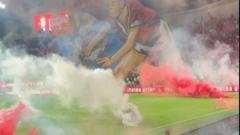Why Did Police Cancel the Tel Aviv Derby Amid Riots?

Published: 2025-10-19 22:00:50 | Category: sport
On 6 November, Maccabi Tel Aviv's Europa League match against Aston Villa is under scrutiny as safety concerns arise following violent riots during a recent derby match in Israel. The Israeli Premier League clash between Maccabi Tel Aviv and Hapoel Tel Aviv was cancelled due to public disorder, leaving 12 civilians and three police officers injured, while several arrests were made. The situation has sparked a debate about fan safety and the implications for future matches.
Last updated: 06 October 2023 (BST)
Key Takeaways
- The derby match between Maccabi Tel Aviv and Hapoel Tel Aviv was cancelled due to violent riots.
- Injuries were reported among civilians and police, with multiple arrests made.
- Hapoel Tel Aviv's management condemned the police's handling of the event.
- Concerns over fan safety have led to a potential ban on Maccabi Tel Aviv fans attending the match against Aston Villa.
- West Midlands Police classified the upcoming fixture as "high risk".
Violence Erupts at Bloomfield Stadium
The Israeli Premier League derby at Bloomfield Stadium was marred by chaos before the scheduled kick-off. Smoke filled the air as fans clashed, leading to a significant police presence and ultimately the cancellation of the match. Israeli police reported that dozens of smoke grenades and pyrotechnic devices were thrown during the unrest, contributing to what they described as a serious breach of order.
Details of the Incident
According to police reports, the violence resulted in injuries to both civilians and officers, with 12 civilians and three police officers requiring medical attention. The situation escalated quickly, prompting authorities to arrest nine individuals and detain another 16 for questioning. The police's response underscored the severity of the situation, with officials stating that the events transcended the boundaries of a sporting event, marking a notable instance of public disorder.
Criticism from Hapoel Tel Aviv
In the aftermath, Hapoel Tel Aviv expressed their discontent with the police's handling of the match. In a statement, the club remarked that it appeared the police were preparing for "war" rather than a sporting event. They condemned the police's actions, stating that most injuries resulted from "brutal police violence" rather than fan altercations. This sentiment highlights an increasing frustration among clubs regarding law enforcement's approach to managing football events.
The Broader Context of Violence in Football
This incident is not isolated, as tensions have escalated in various football matches, especially in light of ongoing protests related to the conflict in Gaza. Comparisons have been drawn to previous incidents involving Maccabi Tel Aviv fans, including violent clashes in Amsterdam linked to a match against Ajax. Such historical precedents contribute to the heightened security concerns surrounding the upcoming match against Aston Villa.
Implications for Future Matches
Following the recent events, Birmingham's Safety Advisory Group recommended that Maccabi Tel Aviv fans should be barred from attending the Europa League match at Aston Villa. This recommendation stems from fears over potential violence, reflecting a cautious approach by local authorities. The UK government is now working to review this ban, exploring additional resources to ensure the safety of all attendees.
Safety Measures Under Review
In light of the recent disturbances, West Midlands Police have classified the fixture against Maccabi Tel Aviv as "high risk." This classification is based on intelligence gathered from previous incidents involving Maccabi Tel Aviv fans. The police's proactive stance aims to mitigate the risks associated with fan attendance, especially considering ongoing tensions tied to the broader geopolitical climate.
Historical Context: Football & Protests
Football has often served as a backdrop for societal tensions, with fans using matches to voice their opinions on political and social issues. Recent protests at various sporting events, including World Cup qualifiers involving Israel, illustrate the intertwining of sports and political activism. These events can create volatile environments, complicating the role of police and event organisers in ensuring public safety.
What Happens Next?
The future of the match between Maccabi Tel Aviv and Aston Villa remains uncertain, hinging on the outcome of safety assessments and discussions among local authorities. As the situation develops, fans and clubs alike are left to grapple with the implications of violence in football, which threaten the spirit of the sport and the safety of its supporters.
FAQs
Why was the Maccabi Tel Aviv vs. Hapoel Tel Aviv match cancelled?
The match was cancelled due to violent riots outside Bloomfield Stadium, which led to injuries among civilians and police officers. The police deemed the situation a serious breach of order.
What injuries were reported during the riots?
Reports indicated that 12 civilians and three police officers sustained injuries during the violent clashes. The nature of the injuries has not been detailed, but they were serious enough to require medical attention.
What measures are being taken for the Aston Villa match?
Birmingham's Safety Advisory Group has recommended that Maccabi Tel Aviv fans be banned from attending the match due to safety concerns. The UK government is reviewing this recommendation and assessing resources for safe hosting.
How have clubs reacted to the violence?
Hapoel Tel Aviv condemned the police's actions, claiming that the violence was largely caused by police brutality rather than fan altercations. This highlights the growing frustration among clubs regarding law enforcement's handling of football events.
What historical incidents contribute to current safety concerns?
Previous violent incidents involving Maccabi Tel Aviv fans, such as clashes in Amsterdam, have raised alarms among authorities. These historical events inform current safety assessments and shape the response to upcoming matches.
As the situation unfolds, it remains crucial for authorities to balance the need for public safety with the rights of fans to enjoy football. How this conflict resolves will likely shape the approach to managing football events in the future. #FootballSafety #PublicDisorder #FanViolence



